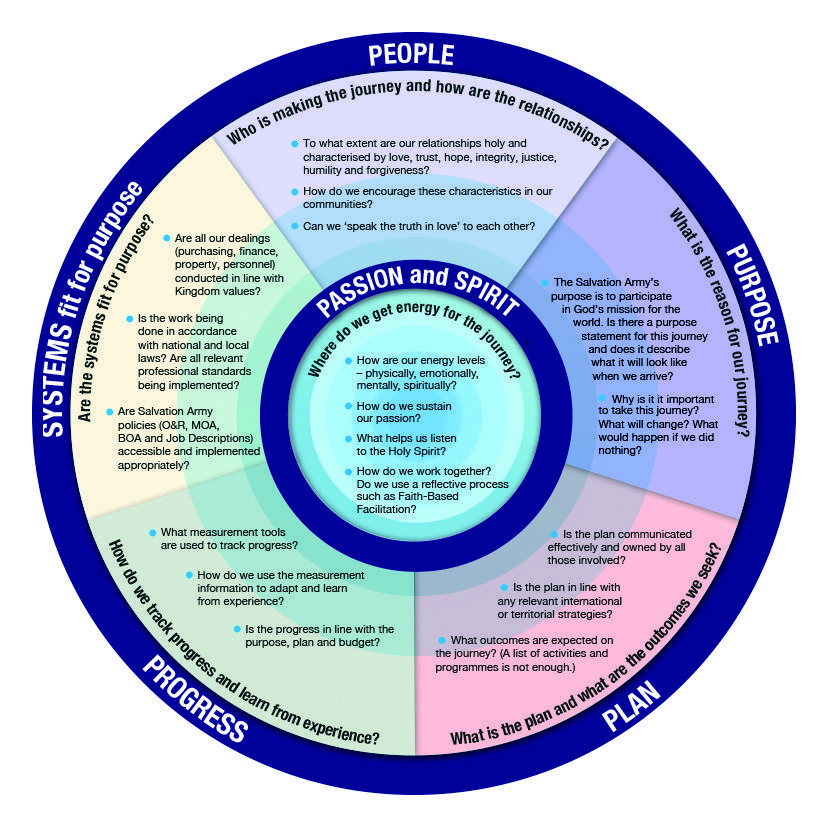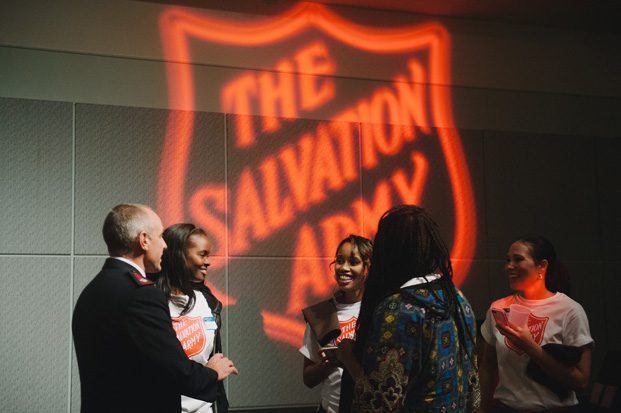Mission accountability framework
By Dean Pallant, Lt. Colonel –
To live the life of boundless salvation that God desires for everyone, we must have the ability to explain where we are going, how we will get there and the difference we are making.
We all need the ability to account for our actions and attitudes to God, each other and the world around us, and at International Headquarters it became apparent that we need resources to help people increase our ability to give an account as:
We are accountable to God.
We are accountable for the way we treat people.
We are accountable to each other.
We are accountable for the difference we make so we can learn and improve.
We need processes and systems that are fit for purpose.

If the International Vision of “One Army with One Mission and One Message” is to be more than a slogan, we need a framework to keep us accountable to God and each other. Thus a new Mission Accountability Framework is being piloted with the intention that everyone in The Salvation Army—from the youngest junior soldier to the General; from the professional social worker to the trombone player in the band—will use it.
This is an ambitious idea. Can we have one framework that is as relevant in the highlands of Papua New Guinea as for social services professionals in The Netherlands? We think it is possible if we answer a common set of questions, relating to our people, passion, purpose, plan and being fit for purpose.
People
First, we start with questions about people as too often we focus accountability on money, programs, budgets or regulations. We believe people are made in God’s image. God’s priority is people, and it must also be ours. All who work and serve in The Salvation Army need to be helped to understand this Christian appreciation of people.
The Mission Accountability Framework asks: “How are the relationships?” This is a challenging question. How are all my relationships? Not just in my family or at work but also at the corps, with my neighbors.
We need to be aware that, in the past, The Salvation Army has unintentionally created an unhealthy dependency in some people. We must be alert to the impact we have on people in the longer term. Dependency is being addressed in many parts of the world. For example, the Pathway of Hope initiative in the United States is helpfully addressing this by emphasizing the importance of moving from “serving” to “solving.”
Passion
Second, and at the center of the Mission Accountability Framework, is the idea of passion and spirit. At the heart of Salvation Army work is our faith in the Lord Jesus Christ and the power of the Holy Spirit that helps us as we journey through life. Our passion, our energy must come from our faith in Christ. We could not do what we do without God.
Jesus taught that our greatest priority should be to love God with all of our being and love our neighbor as ourselves (Matt. 22:36-39). To sustain our passion (and have sufficient energy for the journey) people need a strong relationship with God that is grounded in our faith in him, strengthened by contemplation, prayer and worship. This will lead us to action that he directs but which has been the lifeblood of The Salvation Army. Of course, we are not accountable for the Holy Spirit—God is beyond measurement—but we need to check which sources of passion and energy we are depending upon. The practices of faithful, worshipping people are wellsprings that give life, direction and energy to the people, organization and systems of The Salvation Army.
Every person linked to The Salvation Army needs to be asked where they get the energy to keep going. This is a key accountability question. Many non-Christians come with us on the journey and are attracted to our purpose; they like the way we appreciate the value of people; they identify with mission and approach. They also need energy for this journey, even if they do not recognize that God is the source.

Purpose
Third, we need to check we are clear about our purpose—what are we trying to achieve as The Salvation Army? Everyone serving in the Army must be able to answer the question: “Are you clear what you are trying to achieve in your work?” This should not be a difficult question. Our purpose is not a secret; our purpose is found in our name. However, some people in our ranks have a thin, narrow, incomplete understanding of salvation, seeing it only for “saving souls.” Other people have an equally thin understanding of salvation as “helping people find dignity” or “helping people secure their rights” without any need for God—Father, Son and Spirit.
The Salvation Army Handbook of Doctrine makes our purpose clear:
“All our activities, practical, social and spiritual, arise out of our basic conviction of the reality of the love of God and our desire to see all people brought into relationship with him … Our doctrine reminds us that salvation is holistic: the work of the Holy Spirit touches all areas of our life and personality; all physical, emotional and spiritual well-being, our relationships with our families and with the world around us.”
Our purpose is boundless salvation. This purpose should orientate all our plans, systems, structures, programs and activities. Therefore, if there is any encouragement in Christ, any comfort provided by love, any fellowship in the Spirit, any affection or mercy, complete my joy and be of the same mind, by having the same love, being united in spirit, and having one purpose (Phil. 1:1-2).
Plan
Fourth, we need to have a plan to achieve our purpose, and it must include specific outcomes and not just a list of activities and programs. We are pilgrims on a journey, but we cannot meander. We need to be purposeful travelers who have a plan, seek an outcome, and are determined to make an impact. We can use some of the tools that have served us well previously like SMART objectives (Specific, Measurable, Achievable, Realistic and Time-related) to ensure we have a clear plan. We can use Faith-Based Facilitation to help develop the plan to ensure people are involved in its development and reflect on their issues using the Bible, faith tradition and the Holy Spirit.
The One Army Impact Initiative developed a unifying framework for measurement. It includes seven outcomes all Salvation Army work must be leading to, and tools have been developed to measure them. This includes contextual outcomes—protection and safety, wellbeing and health, formation and education, and service and work—and relational outcomes—hope, love and trust.
These tools will be piloted in a number of territories around the world this year, and then rolled out more widely.
It must be emphasized that it is not all about measurement tools. It is hard to measure characteristics like hope, trust and love, but we all know when we see them. Tools are not the answer in themselves. The priority is to see more hope, trust and love in our relationships. If we can measure this empirically, it will be a bonus.
Progress
Fifth, as we travel towards our common purpose we need to track our progress and learn from our experience. This is being responsible for ministry. There is no point in doing the same thing year after year and not making any progress toward the purpose. That just demoralizes and frustrates people. As we measure our progress, we will be able to see the difference we are making and bring in changes when required. Everything we do should help achieve our purpose.
Fit for purpose
The sixth dimension in the Mission Accountability Framework is ensuring every process and system is fit for purpose. We need systems on the journey to ensure we are accountable and achieving quality. One outcome of the accountability movement is to reduce bureaucracy across The Salvation Army. This will be easier if we are clear about and ensure the systems serve our God-given purpose.
– Excerpted from The Officer
The accountability movement will be built on four pillars:
Governance: To ensure a governance structure, at all levels of The Salvation Army, that is fit for its God-given purpose in the 21st century.
Impact Measurement: To increase transformative change in all Salvation Army work with people and communities through measurement and learning. This will be achieved by improving the quality and effectiveness of Salvation Army programs around the world by measuring progress toward a shared purpose, using a unifying framework for results measurement and learning.
Finance: To monitor, review, upgrade and enhance worldwide Salvation Army financial systems to develop sector-leading practice, ensure wide-ranging stakeholder accountability, facilitate capacity building of finance personnel and enable funding for purpose.
Safeguarding: To affirm and protect the dignity and worth of every individual The Salvation Army cares for whatever his or her personal, cultural, religious or socio-economic circumstances or age.












